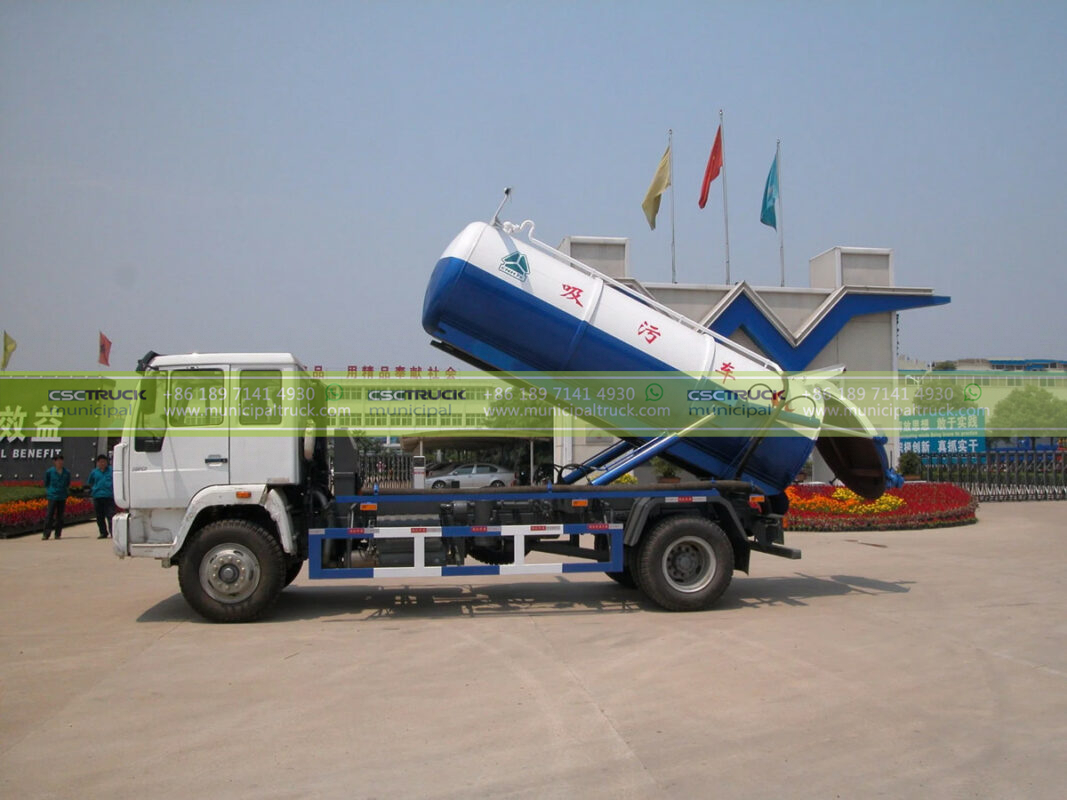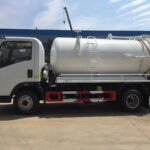In the world of wastewater management, sewage trucks are indispensable for collecting, transporting, and disposing of liquid waste. Among the many components that ensure the efficient operation of these vehicles, sewage truck filters play a critical role. These filters are designed to remove debris, contaminants, and other impurities from the waste, protecting the truck’s systems and ensuring optimal performance. This blog post explores the importance of sewage truck filters, their types, maintenance practices, and how they contribute to the overall functionality of sewage vacuum trucks.
1. Understanding the Importance of Sewage Truck Filters
Sewage truck filters are essential components that safeguard the vehicle’s systems from damage caused by debris and contaminants. In a sewage vacuum truck, the filter ensures that only liquid waste enters the storage tank, while solid particles and other impurities are filtered out. This not only protects the pump and other critical components but also ensures that the waste is handled efficiently and safely.
Without properly functioning filters, sewage trucks are at risk of clogging, pump damage, and reduced operational efficiency. For example, a clogged filter can restrict the flow of waste, leading to increased pressure on the pump and potential breakdowns. By maintaining clean and effective filters, operators can ensure that their sewage vacuum trucks operate at peak performance and avoid costly repairs.
2. Types of Sewage Truck Filters and Their Functions
There are several types of sewage truck filters, each designed to address specific challenges in wastewater management. Understanding the different types and their functions is crucial for selecting the right filter for your sewage truck.
Suction Filters
Suction filters are installed at the inlet of the sewage vacuum truck and are responsible for capturing large debris and solid particles before they enter the pump. These filters are typically made of durable materials such as stainless steel or high-strength polymers, ensuring they can withstand the harsh conditions of wastewater collection.
In-Tank Filters
In-tank filters are located inside the storage tank of the sewage truck and are designed to separate liquid waste from solid particles. These filters help prevent sludge buildup in the tank, ensuring that the waste can be discharged efficiently during disposal. In-tank filters are particularly important for maintaining the cleanliness and functionality of the tank.
Exhaust Filters
Exhaust filters are used to purify the air released from the sewage vacuum truck during operation. These filters capture harmful gases and odors, ensuring that the vehicle complies with environmental regulations and provides a safe working environment for operators.
By using the appropriate combination of filters, operators can enhance the performance and longevity of their sewage trucks, ensuring that they handle waste efficiently and safely.
eeeee
3. The Impact of Filters on Sewage Truck Performance
The performance of a sewage truck is directly influenced by the condition of its filters. Clean and well-maintained filters ensure that the vehicle operates efficiently, while clogged or damaged filters can lead to a range of issues.
Improved Pump Efficiency
One of the primary benefits of sewage truck filters is their ability to protect the pump from damage caused by debris and contaminants. By preventing solid particles from entering the pump, filters ensure that it operates smoothly and efficiently, reducing the risk of breakdowns and extending its lifespan.
Reduced Maintenance Costs
Filters play a crucial role in reducing maintenance costs for sewage vacuum trucks. By capturing debris and preventing it from entering the tank or pump, filters minimize wear and tear on critical components, reducing the need for frequent repairs and replacements.
Enhanced Waste Disposal
Effective filtration ensures that the waste collected by sewage trucks is properly separated and ready for disposal. This not only improves the efficiency of waste management operations but also ensures compliance with environmental regulations.
For operators of sewage vacuum trucks, investing in high-quality filters and maintaining them properly is essential for achieving optimal performance and minimizing operational costs.
4. Maintenance Practices for Sewage Truck Filters
Regular maintenance is key to ensuring that sewage truck filters function effectively and contribute to the overall performance of the vehicle. By following a few simple practices, operators can extend the lifespan of their filters and avoid common issues.
Regular Inspection and Cleaning
One of the most important maintenance tasks is to inspect and clean the filters regularly. This involves checking for clogs, damage, or wear and tear, as well as cleaning the filters to remove accumulated debris. Regular cleaning ensures that the filters continue to function efficiently and prevents pressure buildup in the system.
Timely Replacement
Even with regular maintenance, sewage truck filters will eventually wear out and need to be replaced. Operators should monitor the condition of their filters and replace them as soon as signs of damage or reduced efficiency are observed. Using high-quality replacement filters ensures that the sewage vacuum truck continues to operate at peak performance.
Proper Storage and Handling
When not in use, sewage truck filters should be stored in a clean and dry environment to prevent damage. Proper handling during installation and removal is also essential to avoid tearing or bending the filters, which can compromise their effectiveness.
5. Choosing the Right Filters for Your Sewage Truck
Selecting the right filters for your sewage truck is crucial for ensuring optimal performance and longevity. Several factors should be considered when choosing filters, including the type of waste being collected, the operating conditions, and the specific requirements of the vehicle.
Compatibility with the Sewage Vacuum Truck
The filters must be compatible with the sewage vacuum truck and its systems. This includes ensuring that the filters fit properly and can handle the flow rate and pressure of the vehicle. Consulting the manufacturer’s guidelines or seeking advice from a professional can help operators select the right filters for their needs.
Durability and Material Quality
The durability and material quality of the filters are critical factors to consider. Filters made from high-strength materials such as stainless steel or reinforced polymers are more resistant to wear and tear, ensuring they can withstand the harsh conditions of wastewater management.
Ease of Maintenance
Filters that are easy to inspect, clean, and replace can significantly reduce maintenance time and costs. Operators should look for filters with user-friendly designs and clear instructions for maintenance and replacement.
Sewage truck filters play a vital role in maintaining the optimal performance of sewage vacuum trucks. By protecting critical components, improving efficiency, and ensuring compliance with environmental regulations, these filters are essential for the smooth operation of wastewater management systems. Regular maintenance, timely replacement, and careful selection of filters are key to maximizing their effectiveness and extending the lifespan of sewage trucks. For operators looking to enhance the performance of their vehicles, investing in high-quality filters and adopting best practices for maintenance is a step toward achieving reliable and efficient waste management operations.







